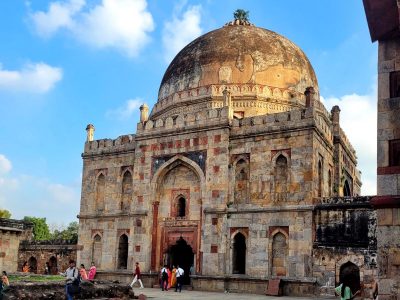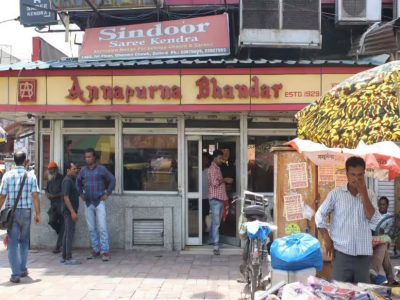A house in the hills is not just a getaway destination, it has given Delhiites a new direction and purpose, a respite from mundane urban existence
Delhi is happening, the hub of opportunities. But excess of anything is bad. The pollution and the population have made life difficult in one of the biggest metropolises in the world. Delhiites need an escape. Some have built houses in the Himalayas as a retreat from their hectic life in Delhi. They are musicians, academics, scientists, writers, bureaucrats and scribes. They have put in a substantial part of their saving in making their dream house in the hills.
For many, this was not a planned move, but are glad it happened. They were out travelling with friends, were shown a piece of land for sale, and they fell for the temptation — it was an easy decision. It was not just the push factor: the green hills are very inviting, almost seductive.
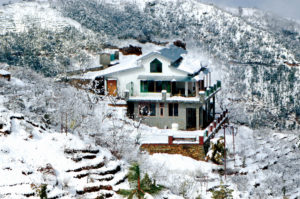
A hasty decision led to a life project, as is the case with Kiran Bhushi, a professor with the Indira Gandhi Open University. Adjacent to an ancient temple, a tall deodar tree, her beautiful cottage is at the base of a hill near Nathuakhan town in Nainital district. It’s an 80-minute beautiful drive from Bhimtal, under the thick canopy of fern trees, golden sunbeams sieving through the dense green foliage, dried fallen leaves giving the hills a copper-like lustre.
Bhushi had to usher all resources at her command over 10 years — a slow and tedious process — to build her dream house — Kafalia Homestay. Now she has a cow, dogs, cats and goats. Her house is taken care of by a Nepali family headed by a matriarch called Parvati — a slender middle-aged woman, mother of half a dozen kids who also plays mother to all the domesticated animals, and climbs a straight tree faster than monkeys.
Over the years, Bhushi has come to realise that she has ‘primal’ connection with the hills. It reminds her of a set of emotions she felt as a child spending time at her grandmother’s place in coastal Andhra. She wants her property be self-sufficient and self-sustaining, growing food and vegetables it needs, harvesting rainwater, no chemical pesticides and fertilisers. By setting an example, she wants to inculcate environment-friendly practices amongst locals, encourage sustainable tourism. She is a supporter of “forage food” or plucking and picking of vegetables, berries and fruits, a hands-on approach towards the protection of biodiversity. She employs local cooking knowledge to popularise native delicacies.
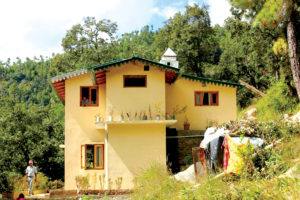
She encourages the urban dwellers to come and participate in her “green endeavour” and contribute in their unique ways. Kafalia Homestay, she envisions, is a platform where people are welcome to come, pursue their passion, showcase their talent — all efforts contributing towards ecologically friendly existence. It’s an organic way of living.
Arjun Bhagat has the advantage of age, he started early. A journalist in his mid-40s, he created a beautiful getaway on the pristine hills close to Harola. His double-storey Rose Cottage is strategically located overlooking the valley. On a clear day, the whole snowline is strung across the sky like a pearl necklace. During the night, stars glimmer in the sky and city lights — Nainital, Ranikhet and Almora — shine at the bottom of the valley. In winter, the cottage is covered in thick white snow blanket. It’s simply heavenly.
Rose Cottage has a big lobby with a high roof and big glass windows. A lot of thinking has gone into its making — each piece of furniture, paintings, artifacts are carefully chosen, blending aesthetically with the overarching theme of a country house. The best part is the huge balcony that overlooks the valley. Dense foliage, new leaves and flowers gleaming in the sun, creepers crawling up the wall, fruits, the sense of space and light and the fresh cool breeze. Silence is a symphony here.
“The idea was to find a place off the beaten track, where it takes a little effort to reach. Where the road ends,” explains Bhagat. Rose Cottage is realisation of this vision. It’s for his family, daughter and his mother, in particular, enjoys spending quality time here. “She grew up in Shimla,” he says to explain his mother’s affinity with the hills.
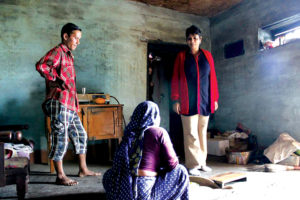
In the last 14 years, he has followed ecologically friendly practices like water harvesting, solar energy for electricity and a ready supply of hot water. He’s particularly proud of the apple and peach orchards. He’s engaged with the local school to encourage plantation of trees, primarily oak, some 2,000 of them in the area. Oak helps retain moisture, deep roots hold the soil tightly and prevent landslides, its dry leaves make excellent manure. “It’s not a commercial place,” says Arjun and adds, “but like-minded people are welcome to the homestay.”
A steep narrow road, not far from Bhimtal lake, takes you to journalist Bhavdeep Kang’s cottage. A flight of stairs downhill leads to the entrance of the cottage nestled in nature, a road meandering in front, some odd shops, and people ambling, the red dusk sky in the backdrop. The terrace is the best place to spend a leisurely afternoon munching on groundnuts. It’s sparsely furnished but equipped with all creature comforts, an ideal place to slow the pace of life. Thanks to Kang’s iron resolve, some local encroachers were warded off. Now it’s her “getaway from the city” and possibly a “retirement home.”
Then there are people who built mud-houses — fairly stable in the rain — some are recuperating after cancer treatment, some make music with their band partners scattered across the globe, made possible thanks to high-speed internet connections. Even research is carried out by private persons in their little ways.
Dr Suman Sahai is a recipient of the Padma Shri in the field of genetics and founder Chairperson of the Gene Campaign, a leading research and advocacy organization, working on issues relating to food, nutrition and livelihoods, biodiversity and environment, biotechnology and bioethics. She has a centre near Nathuakhan, where farmers are treated as indigenous scientists, the custodian of traditional farming knowledge that is critical for preserving agrobiodiversity. She helps local preserve various endangered indigenous varieties of cereal by way of creating community-run seed banks. She also spends quality time nestled in nature.
A house in the hills is not just a getaway destination, it has given people a new direction and purpose to otherwise mundane urban life.


